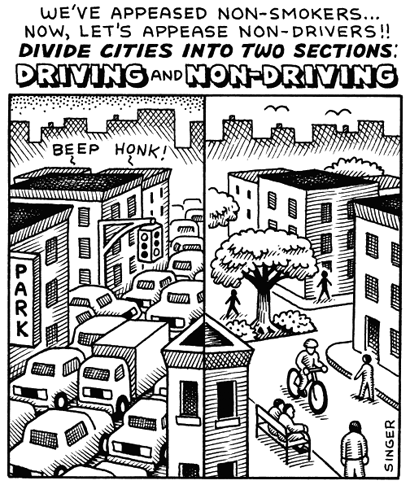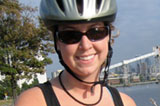driving cars is costing all of us
We are well aware that cars are expensive to own and maintain (more about this). And everyone is vaguely aware that pollution comes from cars and it is bad (more about this). Well, that's true, but there is a lot more to the story than what comes out of your tailpipe or wallet. A whole lot more.
Much of the true cost of driving cars is hidden. Some of this affects the driver, much of it affects society as a whole.
Studies show that 40% of car trips in America are 2 miles or less! And more than half of all Americans live less than 5 miles from where they work. About half of our driving could probably be considered excess or unnecessary, if not more (needs citation).
Your Free Time - Car advertisers offer freedom, but you spend half your life chained to a desk working to pay for them, and half of the rest stuck inside them! Is that freedom? How much time do you spend sitting in traffic, frustrated at red lights, Looking for parking, pumping gas and working to pay for it all? Studies put the average speed of an urban driver at 10mph when stoplights and congestion are factored in (needs citation). All that expensive machinery to go 10mph? What a waste. A recent study reports that the Average American commuter spends 50 hours per year just sitting in traffic. I know plenty who spend a lot more than that (needs citation).
Pollution is more than exhaust- Brake and clutch linings, tire rubber, heavy metals and toxic chemicals are deposited on the road daily across the nation. Rain washes thousands of tons of these contaminates directly into our lakes and streams every year. This is bad for nature and bad for our drinking water.
Cars Are Unfair - Suburban kids watch four times more TV than city kids because there is nothing to do within walking or biking distance. They feel isolated and dependant on their parents who must drive them everywhere. Disabled and elderly people are similarly disenfranchised. Suburbs were built around cars and depend on them, yet a large percentage of the population cannot use them, and are dependent on others for their freedom. In most neighborhoods built in this country since 1950 one cannot conduct the business of daily life without an automobile. yet everyone who pays taxes is supporting road and fuel subsidies, whether or not they benefit from them.
Suburbs - Suburbs were "invented" in the 1940s and 50s when automobiles became more comfortable and reliable - and gas was dirt cheap. Suddenly it was no big deal to live 10 miles or more from the noisy city. People started moving out of town into quiet homes on large sprawling lots. Soon the grocery stores, coffee shops and other services were banned from these neighborhoods with well-intentiond zoning laws. Now that gas is almost $5 per gallon, millions of people are stranded miles from work with no choice but to pay out the nose just to go get a loaf of bread!
Safety & Crime - People flee the cities for the perceived safety of the suburbs yet they are 4 times more likely to die in a car crash because they drive farther and faster than city dwellers. Crime rates change very little - which is safer? Statistics: If you drive ten miles to buy a lottery ticket you are three times more likely to die in a crash than you are to win the jackpot.
Rip Out the Rails - All major American cities used to be networked with trolly and train tracks for public transportation. But From 1930 to about 1950, a consortium of General Motors, Firestone Tire, Standard Oil of California and Phillips Petroleum formed under the name of National City Lines (NCL). With their combined financial clout they purchased and dismantled virtually every streetcar system in the country, thus ensuring the nation's dependancy on automobiles and buses (made by GM). GM was even convicted of conspiracy and fined $5000, but the rails were long gone by then.
Road Rage - Cars feel like a personal territory, but they exist in a shared public space so conflicts occur. Cars cut people off from eachother, communication is not possible or is easily misinterpreted. People are much more courteous when they are face-to-face and must suffer the consequences of rude behavior. When separated by steel and glass, normally-pleasant people behave like animals because they can "get away with it". This is well studied and documented.

30 MPH Thinking - Ever wonder why certain parts of town are charming and certain parts of town are utterly unappealing? The unappealing parts were designed for cars, not humans. The streets are too wide to cross quickly on foot, the store fronts are set back behind sprawling parking lots (no window shopping here). Eateries are surrounded by drive-through lanes instead of outdoor seating. Ugly cinder-block buildings with vast featureless walls are quickly assembled and decorated with some landscaping bark and small evergreens. Huge signs are erected, visible from the off-ramp, ample parking lots built, but virtually no pedestrian amenities such as water fountains or benches. And who cares, because you'll be speeding by most of it in your car anyway.
Big Picture - I'm not suggesting that we stop using gasoline-powered vehicles altogether. We will always need to transport goods and materials in heavy duty vehicles, and I intend to continue driving to the mountains to enjoy nature (for now anyway). What I'm suggesting is that we can drastically reduce our wasteful solo and short driving trips by biking short distances, and using public transportation for medium distances. We need to discontinue building our cities and infrastructure around the automobile and incorporate smarter alternatives at every level.
Oil Spills - In the US an average of 22 oil spills are reported every day from tankers, refineries, pipes and every point in the oil production and distribution system, spilling approximately 10 million gallons of oil per year. If we weren't consuming so much oil, we wouldn't transport and spill so much of it.
COMING SOON: More info, Citations, Much of the info on this page is from "Divorce Your Car, Alvord"




